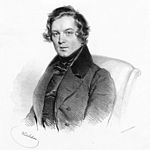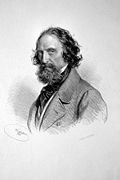About Robert Schumann
- Robert Schumann (German: ['?u?man]; 8 June 1810 – 29 July 1856) was a German composer, pianist, and influential music critic.
- He is widely regarded as one of the greatest composers of the Romantic era.
- Schumann left the study of law, intending to pursue a career as a virtuoso pianist.
- His teacher, Friedrich Wieck, a German pianist, had assured him that he could become the finest pianist in Europe, but a hand injury ended this dream.
- Schumann then focused his musical energies on composing. In 1840, after a long and acrimonious legal battle with Wieck, who opposed the marriage, Schumann married Wieck's daughter Clara.
- A lifelong partnership in music began, as Clara herself was an established pianist and music prodigy.
- Clara and Robert also maintained a close relationship with German composer Johannes Brahms. Until 1840, Schumann wrote exclusively for the piano.
- Later, he composed piano and orchestral works, and many Lieder (songs for voice and piano).
- He composed four symphonies, one opera, and other orchestral, choral, and chamber works.
- His best-known works include Carnaval, Symphonic Studies, Kinderszenen, Kreisleriana, and the Fantasie in C.
- Schumann was known for infusing his music with characters through motifs, as well as references to works of literature.
- These characters bled into his editorial writing in the Neue Zeitschrift für Musik (New Journal for Music), a Leipzig-based publication that he co-founded. Schumann suffered from a mental disorder that first manifested in 1833 as a severe melancholic depressive episode—which recurred several times alternating with phases of "exaltation" and increasingly also delusional ideas of being poisoned or threatened with metallic items.
- What is now thought to have been a combination of bipolar disorder and perhaps mercury poisoning led to "manic" and "depressive" periods in Schumann's compositional productivity.
- After a suicide attempt in 1854, Schumann was admitted at his own request to a mental asylum in Endenich near Bonn.
- Diagnosed with psychotic melancholia, he died two years later at the age of 46 without recovering from his mental illness.
Read more at Wikipedia
See Also
- Famous People's Birthdays on 08 June, Germany
- Famous People's Birthdays in June, Germany
- Famous writer's Birthdays on 08 June, Germany
- Famous writer's Birthdays in June, Germany
- Famous composer's Birthdays on 08 June, Germany
- Famous composer's Birthdays in June, Germany
- Famous conductor's Birthdays on 08 June, Germany
- Famous conductor's Birthdays in June, Germany
- Famous pianist's Birthdays on 08 June, Germany
- Famous pianist's Birthdays in June, Germany
- Famous musician's Birthdays on 08 June, Germany
- Famous musician's Birthdays in June, Germany
- Famous music critic's Birthdays on 08 June, Germany
- Famous music critic's Birthdays in June, Germany
- Famous music pedagogy's Birthdays on 08 June, Germany
- Famous music pedagogy's Birthdays in June, Germany
- Famous musicologist's Birthdays on 08 June, Germany
- Famous musicologist's Birthdays in June, Germany


 Date of Birth:
Date of Birth:  Place of Birth: Zwickau, Saxony, Germany
Place of Birth: Zwickau, Saxony, Germany

